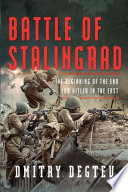Product desciption
Battle Of Stalingrad The Beginning Of The End For Hitler In The East Dmitry Degtev by Dmitry Degtev 9781399052375, 1399052373 instant download after payment.
The Battle of Stalingrad was the bloodiest battle of the Second World War. An estimated 2 million individuals, military as well as civilian, became casualties in a savage struggle which lasted for more than five months. Stalingrad’s strategic position on the River Volga in southern Russia meant that whoever controlled the city controlled access to the oil fields of the Caucasus. Without that oil, the Germans were ultimately destined to fail on all fronts. The Battle of Stalingrad was, therefore, arguably, the most important conflict of the entire war. Yet, the author argues that both Hitler and Stalin lost sight of the real objectives of the campaign, with the capture of Stalingrad becoming seen as the end in itself. Stalingrad was not specified as a particular objective of the Germans in the original plan of Operation Blau. But when the defenders of Stalingrad unexpectedly stood in the way of the Germans, it became the focal point of the German effort. Hitler and his generals were naively sure that after the capture of Stalingrad, victory in the war was a certainty. Stalin and his generals thought that since the Wehrmacht stubbornly fought over the city’s ruins, regardless of the losses it suffered, it meant that the Germans knew more about its importance than they did, and so were determined to hold it at all costs. In fact, the strategic importance of Stalingrad was greatly exaggerated. The scale of the German operation to seize the Caucasus was immense, with an operation stretching for 1,500,00 kilometres (approximately equal to the distance between Berlin and Moscow). This involved laying routes for tank and infantry divisions through areas of virtual desert where there was an almost complete absence of railways and highways. No consideration was given to the needs of troops in fuel, ammunition, food or even water. At the same time, the unrealistic plan to capture the Caucasus did not provide any alternative options in case the main operation failed, which it was doomed to do. As for the Soviets, frightened and broken by the military disasters near Kerch and Kharkov, when entire armies were captured, Stalin authorized the retreat of the Red Army to the Volga, which turned into a stampede. But then the Soviet leader abruptly changed his mind and issued the famous order ‘Not a step back!’ While historians state that this order inspired the Soviet troops to resist and strengthened discipline, it in fact led to an increase in the number of defectors and collaborators. This ground-breaking study of the Battle of Stalingrad is a highly graphic chronicle of the fighting, shown from two sides, written by a Russian historian using much material previously unpublished in the West. It details the efforts of all branches of the armed forces; tanks, artillery, infantry, aviation and, for the first time, the important contribution of the Russian river flotilla.


